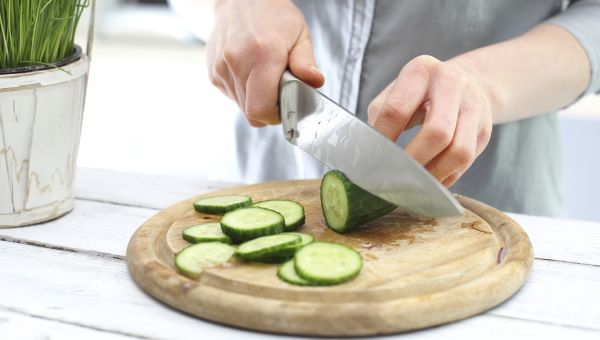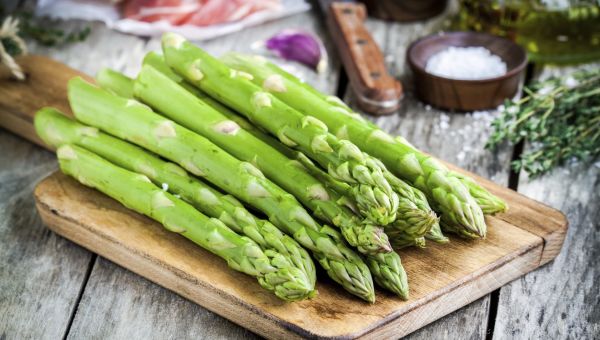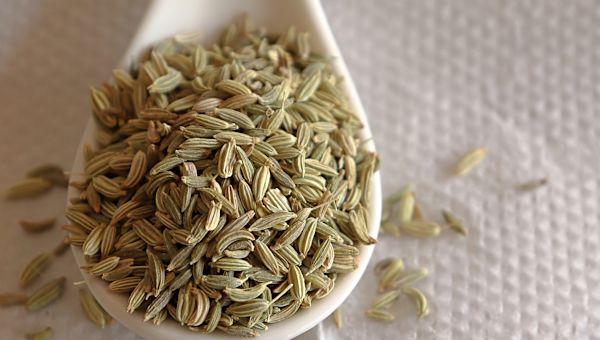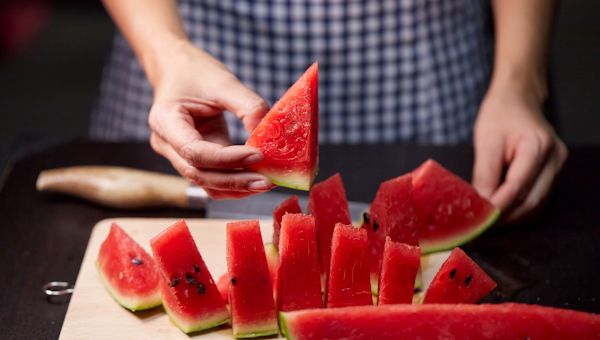8 foods that may help ease bloating
These common eats can be found in many supermarkets.
Updated on June 20, 2025

Odds are you’re familiar with the abdominal tightness and discomfort of bloating. Among other issues, bloating can be caused by overeating, constipation, and irritable bowel syndrome (IBS). It’s rarely serious but can have some unpleasant side effects.
There are natural and surprisingly simple ways to ease many episodes of bloating. Start by heading to the supermarket for these foods.

Bananas
A diet high in sodium can lead to water retention, which causes bloating. The American Heart Association recommends consuming no more than 1,500 milligrams (mg) of salt per day. Most adults in the United States get more than 3,500 mg daily. They also don’t get enough potassium, which can reduce some negative effects of sodium. A single banana provides about 420 milligrams of potassium, 12 percent of the daily recommended value.
Bonus tip: Ditch the gum. Chewing it allows excess air into your stomach, which can result in bloating.

Cucumbers
Bloating can occur when a person is dehydrated. Since they’re about 97 percent water, cucumbers are considered to be hydrating food. That high water content also makes cukes a natural diuretic, which are agents that expel salt and water from your body, reducing bloating. Plus, cucumbers contain 6 percent of the daily recommended value of fiber per cup, which helps with digestion. Try celery, too—it also contains about 6 percent of the daily recommended serving of fiber, per cup.
Bonus tip: Foods won’t do any good if the cause of your bloating is a food allergy or intolerance, like gluten or dairy. See your healthcare provider if you suspect your bloating is the result of an allergy.

Asparagus
This spring veggie is rich in fiber, as well as vitamins and minerals that aid in digestion and promote good gut bacteria. A single serving of asparagus provides 16 percent of the daily recommended value of iron, 13 percent of vitamin B1, and 17 percent of folate. Plus, like cucumber, asparagus acts as a diuretic.
Bonus tip: Carbonated drinks like soda and seltzer can lead to bloat because they force you to swallow excess air. Limit these drinks to help curb bloating.

Fennel Seeds
Poor digestion can cause gas and bloating, but a few seeds could potentially help the problem. Fennel seeds are commonly used in Southeast Asian countries for purported digestive benefits. They won’t address the root causes of chronic condition like Crohn’s disease or irritable bowel syndrome, but they may provide some relief for occasional bloating caused by digestive problems. Evidence suggests they might relieve constipation, gas, cramping, and indigestion. Incorporate fennel seeds into your cooking or just chew a few.
Bonus tip: Salt encourages water retention and bloating. Be sure to check the packages of processed foods; canned vegetables, soups, and frozen dinners are especially high in sodium.

Watermelon
This juicy, colorful fruit contains two key components to beating belly bloat: potassium and water. Per cup, watermelon contains about 175 milligrams of potassium, an agent that helps regulate sodium in the body, reducing bloating. Plus, it’s a diuretic that helps flush out excess water.
Bonus tip: Limit your alcohol intake. Alcohol tends to promote gas formation in your digestive system. This trapped gas can lead to bloating and discomfort.

Ginger Root
For thousands of years, ginger has been used all over the world to soothe stomach troubles such as indigestion, gas, nausea, and diarrhea. Studies suggest it does this partly by aiding gastric emptying, or the movement of food through the stomach. To eat ginger, peel it, grate its flesh, and add some to your next dish, juice, or smoothie.
Bonus tip: Drinking through a straw siphons excess air into your stomach. Avoid belly bloat by sipping your non-carbonated drink out of a glass.

Yogurt
If your bloating is caused by poor digestion, eating yogurt may help. The live cultures in yogurt promote good bacteria in the gut that aid in regular digestion. For the best results, choose yogurt high in probiotics. Opt for plain yogurt, too—the artificial sugars in sweetened yogurt can contribute to bloating.
Bonus tip: Constipation can cause bloating. To relieve it? Get plenty of dietary fiber, fluids, and physical activity. If it persists, speak with a healthcare provider.

Kimchi
Kimchi is a popular, traditional Korean side dish made of fermented vegetables such as cabbage, radishes, and green onions. The fiber and probiotics in kimchi help to promote regular bowel movements and prevent constipation, two causes of bloating. One serving of tangy, sour, spicy kimchi contains 10 percent of the daily recommended value of fiber.
Bonus tip: Eating too much food, too quickly can cause bloating. Avoid the discomfort by chewing your food well and eating slowly.

MedlinePlus. Abdominal bloating. June 11, 2024.
International Foundation for Gastrointestinal Disorders. Understanding Bloating and Distension. Accessed June 20, 2025.
Northwestern Medicine. How to Beat the Bloat: Why Bloating Happens and How to Prevent It. May 2025.
Cynthia Weiss. Mayo Clinic Q and A: Food to reduce bloating. Mayo Clinic. September 12, 2023.
Mayo Clinic. Water retention: Relieve this premenstrual symptom. November 5, 2024.
American Heart Association. How much sodium should I eat per day? January 5, 2024.
UCLA Health. 6 things you can do to prevent bloating. April 29, 2024.
Mayo Clinic. Belching, gas and bloating: Tips for reducing them. January 30, 2024.
Cleveland Clinic. Natural Diuretics to Reduce Water Retention. November 3, 2021.
National Institute of Diabetes and Digestive and Kidney Diseases. Symptoms & Causes of Celiac Disease. October 2020.
National Agriculture in the Classroom. Asparagus Nutrition Facts. Accessed June 20, 2025.
Hamdi A, Viera-Alcaide I, et al. Asparagus Fructans as Emerging Prebiotics. Foods. 2022 Dec 23;12(1):81.
Redondo-Cuenca A, García-Alonso A, et al. Nutritional composition of green asparagus (Asparagus officinalis L.), edible part and by-products, and assessment of their effect on the growth of human gut-associated bacteria. Food Res Int. 2023 Jan;163:112284.
Naseer M, Poola S, et al. Therapeutic Effects of Prebiotics on Constipation: A Schematic Review. Curr Clin Pharmacol. 2020;15(3):207-215.
Slavin J. Fiber and prebiotics: mechanisms and health benefits. Nutrients. 2013 Apr 22;5(4):1417-35.
Olas B. A Review of the Pro-Health Activity of Asparagus officinalis L. and Its Components. Foods. 2024 Jan 16;13(2):288.
Das B, Rabalais J, et al. The effect of a fennel seed extract on the STAT signaling and intestinal barrier function. PLoS One. 2022 Jul 8;17(7):e0271045.
Cleveland Clinic. Foods That Help Reduce Bloating. November 1, 2021.
National Center for Complementary and Integrative Health. Ginger. February 2025.
Anh NH, Kim SJ, et al. Ginger on Human Health: A Comprehensive Systematic Review of 109 Randomized Controlled Trials. Nutrients. 2020 Jan 6;12(1):157.
Nikkhah Bodagh M, Maleki I, et al. Ginger in gastrointestinal disorders: A systematic review of clinical trials. Food Sci Nutr. 2018 Nov 5;7(1):96-108.
National Institute of Diabetes and Digestive and Kidney Diseases. Treatment for Constipation. May 2018.
NC State Extension. Understanding and Making Kimchi. Accessed June 20, 2025.
Park KY, Jeong JK, et al. Health benefits of kimchi (Korean fermented vegetables) as a probiotic food. J Med Food. 2014 Jan;17(1):6-20.
Song E, Ang L, et al. Effects of kimchi on human health: a scoping review of randomized controlled trials. J. Ethn. Food 10, 7 (2023).
More On


video

article

slideshow


video


video
